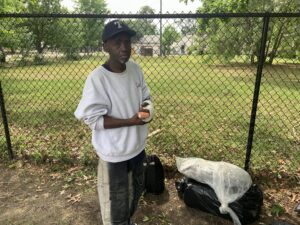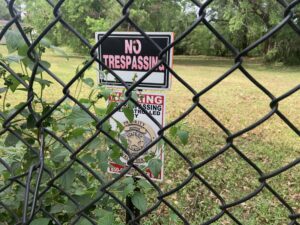
Staying “safer at home” is impossible to do when you don’t have a home.
For the homeless, finding something as essential as a clean bathroom has become even harder. Shelters have closed, fewer people are showing up with meals, places they were used to stopping for a quick hygiene break are closed, and maintaining 6 feet of distance — forget about it.
With COVID-19 running rampant, the homeless are one of the most vulnerable and susceptible groups. If infected, the homeless are more likely to get much sicker or die due to a lack of reliable healthcare.
But some local homeless men and women have greater concerns than contracting the disease.
Cedric Johnson, a man in the fight to stay healthy and find housing, says his priority is simply surviving.
“A lot of these places want us out. We still need places to live, to wash, and to eat. I stay wherever I can. A lot of these places throw food into the garbage and that’s how I eat. It’s about surviving, I’m more worried about that than corona,” Johnson said.
Some say the Kearney Center, an entry point for those experiencing homelessness, has been turning them away.
Audra Peoples, director of communications for the Kearney Center, says the center is still doing all it can for its clients.
“People are still being served. Now they’re not served in the traditional way that we have been accepting clients at the Kearney Center but it’s all in an effort to reduce community spread,” Peoples said.
The center says it is continuing to serve at both the center and offsite locations by providing services including daily COVID-19 screenings, partnering with Bond Community Health Center and even moving clients into hotels.
With it already being near impossible for homeless people to maintain social distance, the Centers for Disease Control and Prevention is advising homeless service providers to ensure that beds/mats are at least three feet apart, leaving more people outdoors.
On the other side of the brick building, pallets and garbage bags holding belongings line the sidewalks of the street.
Kenneth Henry, a homeless man who claims he was denied entry into the Kearney Center, hasn’t found a place to lay his head or very much compassion.
“A few people came over here and passed out food but they [the center] haven’t done much of anything,” said Henry. “The place you would think would have the most compassion hasn’t done anything.”

Photo by Caleesha Moore
Henry claims even the police are driving them out.
“Last night they came and made people leave from over there (in front of the Kearney Center), I’ve been out here for four days and I hadn’t seen that before,” Henry said.
With trespassing charges looming, many fear that there is no place for them in this crisis, forcing them to make the best of wherever they are.
Melissa Kessler has been homeless since she was just 16 years old. Now an adult on the streets of Leon County, she believes a little kindness can go a long way.
“What we need right now is more compassion for humans,” Kessler said.
As of April 13, Leon County had 150 confirmed cases of coronavirus. A pandemic on top of the city’s homeless crisis has exposed a lot of flaws in the system and how people are being cared for in a time of need. If America’s economic crisis continues, the existing homeless won’t be the only ones in need of housing.